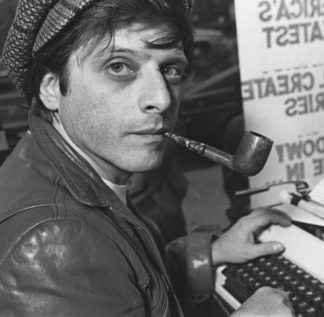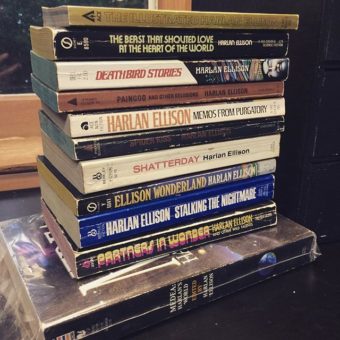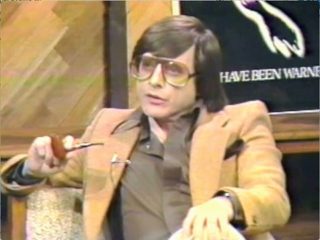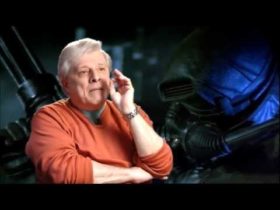 What is there to say about writer/gadfly Harlan Ellison? Frankly, not a whole lot that hasn’t already been said. As has been widely proclaimed elsewhere, the late Mr. Ellison was a singularly brash, opinionated, abrasive and even violent man, being that rare writer whose public notoriety matched, if not exceeded, his fame as a wordsmith.
What is there to say about writer/gadfly Harlan Ellison? Frankly, not a whole lot that hasn’t already been said. As has been widely proclaimed elsewhere, the late Mr. Ellison was a singularly brash, opinionated, abrasive and even violent man, being that rare writer whose public notoriety matched, if not exceeded, his fame as a wordsmith.
The late Mr. Ellison was a singularly brash, opinionated, abrasive and even violent man, being that rare writer whose public notoriety matched, if not exceeded, his fame as a wordsmith.
Harlan Ellison, or HE, was an individual who elicited a strict love-him or hate-him response, although I must admit that even those of us who loved him weren’t always overjoyed by his behavior. Reading the 2017 HE biography A LIT FUSE by Nat Segaloff was both an enlightening and exasperating experience—exasperating because so much of Ellison’s behavior (mailing a dead rat to a publisher, physically assaulting fellow writers and fans at conventions, groping author Connie Willis) was so indefensible. Nonetheless, we fans stuck by HE throughout his turbulent sixty-plus year career.
It’s a curious fact that despite his longevity HE never succeeded in attaining the level of fame, or even infamy, that would appear to have been his due. As was pointed out by author Jeet Heer, many of the authors HE supported and/or mentored over the years (such as Octavia Butler, Samuel Delany and J.G. Ballard) went onto attain a level of mainstream respectability that Ellison, whose notoriety was confined largely to science fiction circles, never achieved. The reason it took so long for this obituary to appear (a full two weeks after the fact) is that, simply, I didn’t learn of Ellison’s June 28 demise until now. Front page news it wasn’t.
…many of the authors Harlan Ellison supported and/or mentored over the years (such as Octavia Butler, Samuel Delany and J.G. Ballard) went onto attain a level of mainstream respectability that Ellison, whose notoriety was confined largely to science fiction circles, never achieved.
This public neglect is due, Heer postulates, to Ellison’s “limited range,” he apparently being a writer “whose readership leans heavily on people who read him as a teen.” While that was certainly true in my case (more on this in a bit), I strongly disagree about Ellison’s literary shortcomings. Certainly not all his work was award-caliber, but a lot of it was (he won literally every major award in the science fiction-fantasy-horror field), and I’d argue that his collections GENTLEMAN JUNKIE and STRANGE WINE are equal to the work of nearly any modern American writer one can think of. I’d also point to his published screenplays I, ROBOT and NONE OF THE ABOVE (neither of which were made into movies but do thankfully exist in book form), both of them masterful examples of the form, and I’m equally partial to HE’s essays and reviews, contained in must-own volumes like AN EDGE IN MY VOICE, ANGRY CANDY and HARLAN ELLISON’S WATCHING.
 The true reasons for HE’s neglect, I’d guess, are myriad. There’s the fact that his oeuvre consisted largely of short stories and essays, with very little long-form fiction. There’s also the fact that his output slowed considerably in his final decades, whose Ellison publications consisted of a few scattered short stories and essays, a couple novellas and a lot of repackaged fiction from earlier in his career. Above all that, of course, was the fact that, simply, HE was a giant pain in the ass, with VERY stringent rules about how his work was to be presented. His major stipulation was that his writing NOT be labelled as science fiction, a decree he enacted in his standard manner: through bullying, which doesn’t appear to have worked too well on publishers. It’s certainly no accident that much of HE’s writing over the last few years was self-published.
The true reasons for HE’s neglect, I’d guess, are myriad. There’s the fact that his oeuvre consisted largely of short stories and essays, with very little long-form fiction. There’s also the fact that his output slowed considerably in his final decades, whose Ellison publications consisted of a few scattered short stories and essays, a couple novellas and a lot of repackaged fiction from earlier in his career. Above all that, of course, was the fact that, simply, HE was a giant pain in the ass, with VERY stringent rules about how his work was to be presented. His major stipulation was that his writing NOT be labelled as science fiction, a decree he enacted in his standard manner: through bullying, which doesn’t appear to have worked too well on publishers. It’s certainly no accident that much of HE’s writing over the last few years was self-published.
HE was a giant pain in the ass, with VERY stringent rules about how his work was to be presented.
Another problem HE had in terms of audience acceptance was that he was always far ahead of his time. These days expletive-filled rants of the type Ellison tended to write are all the rage, and (online at least) appear to have replaced polite conversation as the preferred mode of discourse. In past decades that wasn’t the case, with HE’s angry and unsubtle manner seeming rather out of place. Of course, his commentaries, unlike so much of the unfocused outrage we see today, were always thoughtful and staunchly fact-based; as he stated on more than on occasion, everyone does not have the right to their opinion but, rather, their informed opinion, a decree I’ve taken to heart.
Beyond that I don’t think there’s much I can say about Harlan Ellison that will sway anyone’s opinion of him one way or the other. Quite simply, he was who he was, and people will likely be debating his legacy for years to come. The man himself, I’m sure, wound not have had it any other way.
 Onto what every Ellison obituary must contain: a personal reminiscence. I first discovered the agonies and ecstasies of Harlan E. back in 1985, in a two-part Starlog magazine interview. Meant to promote his new gig as Creative Consultant on CBS’s TWILIGHT ZONE reboot (which like quite a few HE gigs concluded with bitterness and litigation), it showcased the man in rare form, dismissing BACK TO THE FUTURE as a “piece of shit,” insulting Starlog (“You’ve brought up an audience of kids who cannot tell good from bad”) and his interviewer (“You’re like someone on the first day of a relationship looking for the end of it”), and promising that “if you call me a science fiction writer in this story, I’ll find you and tear out your liver.”
Onto what every Ellison obituary must contain: a personal reminiscence. I first discovered the agonies and ecstasies of Harlan E. back in 1985, in a two-part Starlog magazine interview. Meant to promote his new gig as Creative Consultant on CBS’s TWILIGHT ZONE reboot (which like quite a few HE gigs concluded with bitterness and litigation), it showcased the man in rare form, dismissing BACK TO THE FUTURE as a “piece of shit,” insulting Starlog (“You’ve brought up an audience of kids who cannot tell good from bad”) and his interviewer (“You’re like someone on the first day of a relationship looking for the end of it”), and promising that “if you call me a science fiction writer in this story, I’ll find you and tear out your liver.”
Said interview was a sharp contrast to the uncritical fanboyish tenor of most Starlog articles, and struck me like the proverbial atom bomb. I became an instant fanatic, and grew determined to track down every Harlan Ellison book in existence. As it happened, I managed to find most of them, and even got to meet the man in person a few years later.
That meeting occurred at a book signing held at the 1991 San Diego Comic-Con. I’ll warn you in advance that it wasn’t a terribly auspicious encounter, but will always be important in my life; it’s not often that a figure about whom you’ve read for years turns out to fully live up to his image.
“if you call me a science fiction writer in this story, I’ll find you and tear out your liver.”
As I recall, I was waiting in a line that wound around a booth in the convention dealers’ room, wherein HE was happily chatting away as he signed books. Somebody leaned in to whisper something to him (evidently a warning that the line was moving slowly), to which Ellison replied “Oh, in that case I’ll stop chatting.” He didn’t, of course, and at one point turned to us to explain that a kid at the front of the line, whom he likened to “a cold I can’t get rid of,” was monopolizing his time, and advised that if the kid didn’t leave soon we should all surround him and beat him up.
Eventually I got to the front of the line and, having heard Ellison mention a Fellini short whose name he couldn’t remember that featured Anita Ekberg stepping out of a billboard, informed him that the film in question was BOCCACCIO 70. He disagreed, leading to a mini-argument and eventual detente, with Ellison signing two books and a poster for me (regarding BOCCACCIO 70, I believe we were both correct, as I was proclaiming the name of the film containing the Fellini short in question, while he was evidently wanting the name of said short, which was THE TEMPTATION OF DR. ANTONIO—or, for the nerdier among you, LA TENTAZIONI DEL DOTTOR ANTONIO).
 Later that day HE gave one of his priceless lectures. Among the highlights I recall were a woman asking him which of his books she should “start with” and he answering “TESS OF THE D’URBERVILLES,” and his very characteristic proclamation of his love for his wife—which was apparently so profound that if he were to choose between all of us in the audience contracting Legionnaires’ disease and his wife suffering similarly, “forget it, you’re gone!”
Later that day HE gave one of his priceless lectures. Among the highlights I recall were a woman asking him which of his books she should “start with” and he answering “TESS OF THE D’URBERVILLES,” and his very characteristic proclamation of his love for his wife—which was apparently so profound that if he were to choose between all of us in the audience contracting Legionnaires’ disease and his wife suffering similarly, “forget it, you’re gone!”
Gone now is Harlan Ellison, truly a one-of-a-kind individual who, questionable though his behavior often was, definitely left a mark. I’ll conclude this article in a self-centered (and so very Ellisonian) manner, by admitting that I consider it a singular honor to be able to say that I got into it with Harlan Ellison (even if the subject of the altercation was far from the stuff of which great arguments are made), and did so without incurring any violence or lawsuits. I’m a lucky man indeed.
